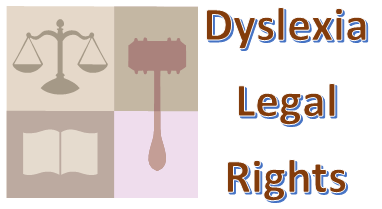Dyslexia & the Law
Dyslexia
What is Dyslexia?
Dyslexia is characterised as a lifelong reading disorder caused by a neurological difference in the brain. People with dyslexia’s intelligence does not match up to their performance in academic areas such as reading, spelling and writing. It is important to get a diagnosis of dyslexia quickly because with the right support people with dyslexia can achieve outstanding results in education, employment and other areas of life. The right support can address the problems often associated with dyslexia.

Dyslexia Diagnosis
Dyslexia can be diagnosed through a series of approved test which are memory, processing speed, ability to reason with words and the ability to reason without words. Our expert psychologist will compare the client’s underlying cognitive ability (as measured by these tests) with their performance on literacy test measuring, reading, spelling, and handwriting. Where the expert psychologist finds the client’s, academic achievement is inconsistent with their underlying ability (IQ) a diagnosis of dyslexia may be made. To read more about dyslexia symptoms click this link
Dyslexia Assessments
Our dyslexia assessment can take up to are completed at the client’s pace, we do not set dictate that the assessment must be completed within three hours. The assessment can be conducted at home or in the Advanced Assessments Assessment Centres. The Dyslexia Diagnostic Assessment will measure reading, writing and spelling, measure handwriting and fine motor skills, and observe the learner’s ability such as speed of processing language, memory and speech. Through this assessment, the client will be formally diagnosed. Must important we will provide strategies and an action plan for the client the reach their full potential.
Find Out More About Dyslexia and the Law
Legislation - British Dyslexia AssociationMental Health Law
Mental Health and the Law
There is a strong relationship between mental health and the law, as far as the rights of people with mental illness is concerned the World Health Organisation outline 10 basic principles that should protect the rights of people with mental illness:
Mental Health Care Law: 10 Basic Principles - World Health Organisation
- The promotion of mental health and prevention of mental disorders.
- Access to basic mental health care.
- Mental health assessments in accordance with internationally accepted principles.
- Provision of the least restrictive type of mental health care
- Self-determination
- Right to be assisted in the exercise of self-determination
- Availability of review procedure
- Automatic periodical review mechanism
- There must be a qualified decision-maker to detain the person
- Respect for the rule of law.
Psychology and the Law
Expert Psychologists who work with individuals who have mental illnesses frequently have two provide expert opinion for the prosecution and defence in criminal cases.
Mental health law includes areas such as the insanity plea, fitness to stand trial and testamentary capacity. Mental health law is also concerned with establishing mens rea and culpability, and compulsory detention.
The intersection between mental health and the law is further developing in the area of forensic evaluation of children and adolescents in child custody, its application to delinquency, maltreatment, personal injury and court-ordered evaluations.
The Mental Health Act 1983
How is Section 2 of the Mental Health Act 1983 Used?
Section 2 of the Mental Health Act provides the ability of mental health professionals to detain and treat people under the Mental Health Act When they are too unwell to care for or make decisions for themselves. The purpose of Section 2 is to ask the patient to come into the hospital for an assessment to determine whether they have a severe end enduring mental illness. Their detention is in the interest of their own health and safety or the protection of other people. Admission under Section 2 normally lasts for 28 days.
How is Section 3 of the Mental Health Act 1983 Used?
A Section 3 of the Mental Health Act is commonly known as a Treatment Order. This means the patient is compulsorily treated in hospital when certain conditions are met. These are that the individual is suffering from a mental disorder which is of such a degree that warrants the person being compulsorily detained in hospital. There must be a risk to the person or other people. The other conditions are, the treatment cannot be given without the Section 3 being in place, and there must be appropriate treatment available. Detention under Section 3 of the MHA can last up to 6 months.
